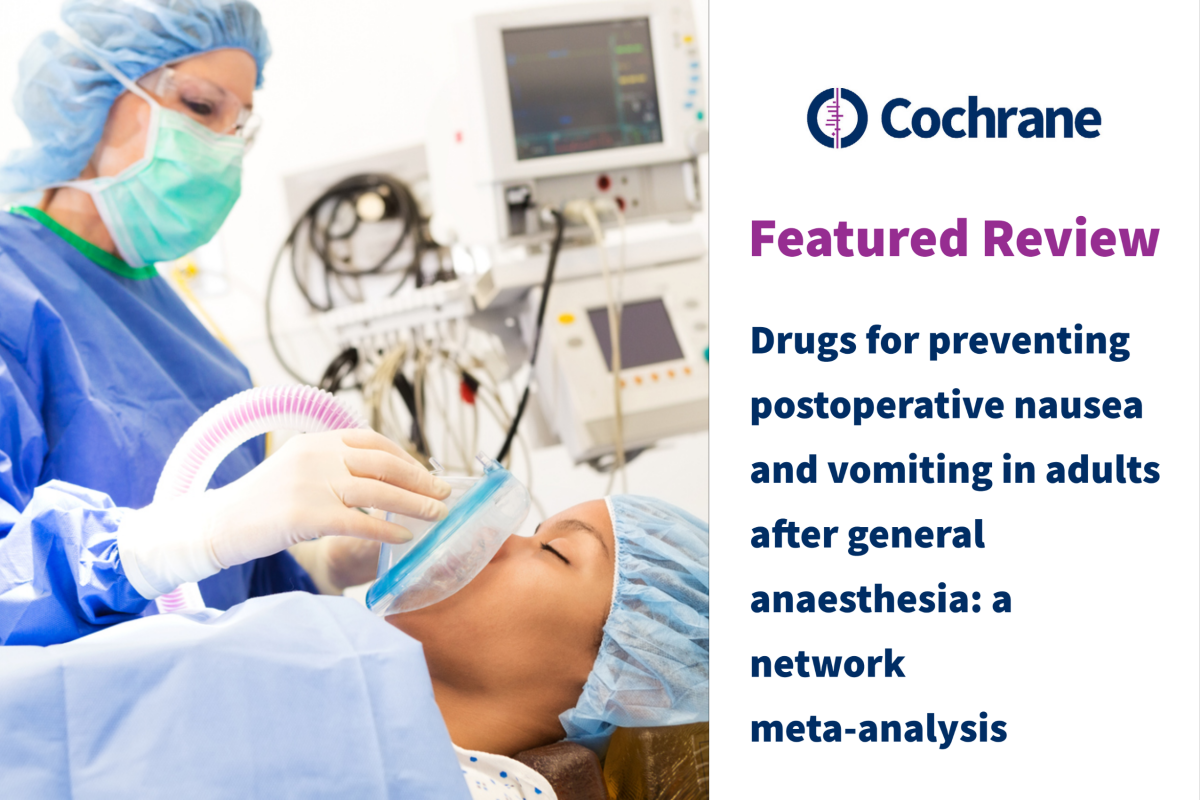
Which medicines work best to stop people from being sick (vomiting) after an operation?
Why are people sick after an operation?
Feeling sick (nausea) or being sick (vomiting) is a common unwanted effect of general anaesthesia—medicine that makes people unconscious and unresponsive so they don't move or feel pain during an operation.
Most unwanted effects of general anaesthesia, including feeling or being sick, happen immediately and stop after a few hours, although some people may continue to feel sick for up to a day. If people carry on feeling or being sick, they might have to stay in hospital longer than expected and may experience other unwanted effects or complications.
Women are more likely to be sick after an operation, as are people taking opioid painkillers, those who have had motion sickness, and those who have been sick after previous operations.
Medicines to stop people from being sick
Medicines called antiemetics are given to stop people from feeling or being sick. For people at higher risk of being sick, these medicines may be given before or during anaesthesia.
Antiemetic medicines are grouped into six classes based on how they act. Combining medicines from different classes sometimes makes them work better.
Why we did this Cochrane Review
We wanted to find out which medicines work best to stop people from being sick after an operation and cause the fewest unwanted effects. Common unwanted effects of antiemetic medicines include headache, constipation, movement disorders such as tremors, sleepiness, irregular heartbeat, and wound infection.
What did the authors do?
The authors of this review searched for studies that looked at the use of antiemetic medicines in adults having general anaesthesia to stop people from being sick afterwards.
They looked for randomised controlled studies, in which the treatments people received were decided at random. This type of study usually gives the most reliable evidence about the effects of a treatment.
Search date
Authors included evidence published up to November 2017; in April 2020, we found another 39 studies, which are not yet included in the analysis.

What they found
The authors found 585 studies in 97,516 people (83% women) who were given antiemetic medicines before or during general anaesthesia. Most studies were conducted in Asia, Europe, or North America.
These studies measured how many people were sick in the first 24 hours after their operation and how many unwanted effects were reported. Most studies compared medicines (given alone or in combination) with a dummy (placebo) treatment.
Authors compared all antiemetic medicines with each other using a mathematical method called network meta-analysis.
What were the main results and how reliable are these results?
Compared with placebo treatment, 10 out of 28 single medicines and 29 out of 36 combinations of medicines stopped people from being sick in the first 24 hours after their operation (282 studies). Combinations of antiemetic medicines generally worked better than single medicines given alone. However, aprepitant, casopitant, and fosaprepitant worked as well alone as most combinations of antiemetics. The single medicine that worked best was fosaprepitant, followed by casopitant, aprepitant, ramosetron, granisetron, dexamethasone, tropisetron, ondansetron, dolasetron, and droperidol.
The authors of this review are confident that aprepitant, ramosetron, granisetron, dexamethasone, and ondansetron stopped people from being sick. They are moderately confident about how well fosaprepitant and droperidol worked, but this finding may change when further evidence becomes available. They are uncertain about how well casopitant, tropisetron, and dolasetron worked.
Not all studies reported serious, life-threatening unwanted effects. The review authors are uncertain how many of these effects were reported when taking an antiemetic medicine and whether serious, life-threatening unwanted effects occur at a similar rate or are reduced compared to placebo (28 studies).
Of the best medicines for stopping being sick, granisetron and ondansetron probably made little to no difference in the occurrence of unwanted effects compared to placebo, although dexamethasone and droperidol may cause fewer unwanted effects than placebo. Authors are uncertain about unwanted effects with aprepitant and ramosetron (61 studies). They found no studies reporting unwanted effects for fosaprepitant.
Authors are less confident about unwanted effects of all other antiemetic medicines because they found little reliable evidence about this. The results for unwanted effects are likely to change when further evidence is available.
Conclusions
For people at higher risk, some medicines worked well to stop them from being sick after general anaesthesia. The most reliable antiemetic medicines were aprepitant, ramosetron, granisetron, dexamethasone, and ondansetron, followed by fosaprepitant and droperidol.
However, the authors did not find enough reliable evidence about potential unwanted effects to rank these medicines reliably according to how well they worked.
- Read the full review on the Cochrane Library
- Read the review in Malay
- Listen to the podcast in English and Spanish
- Visit the Cochrane Anaesthesia Group website
